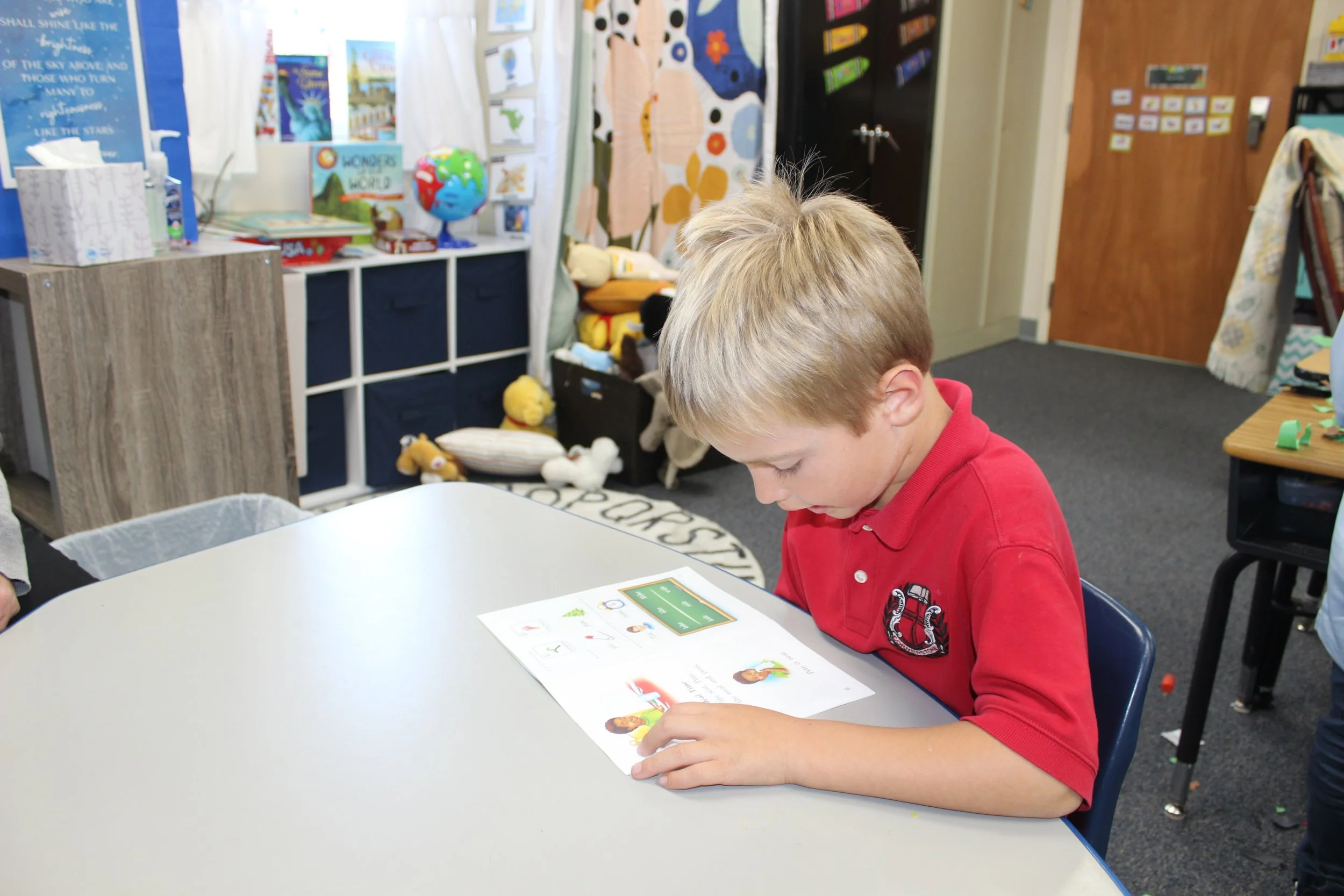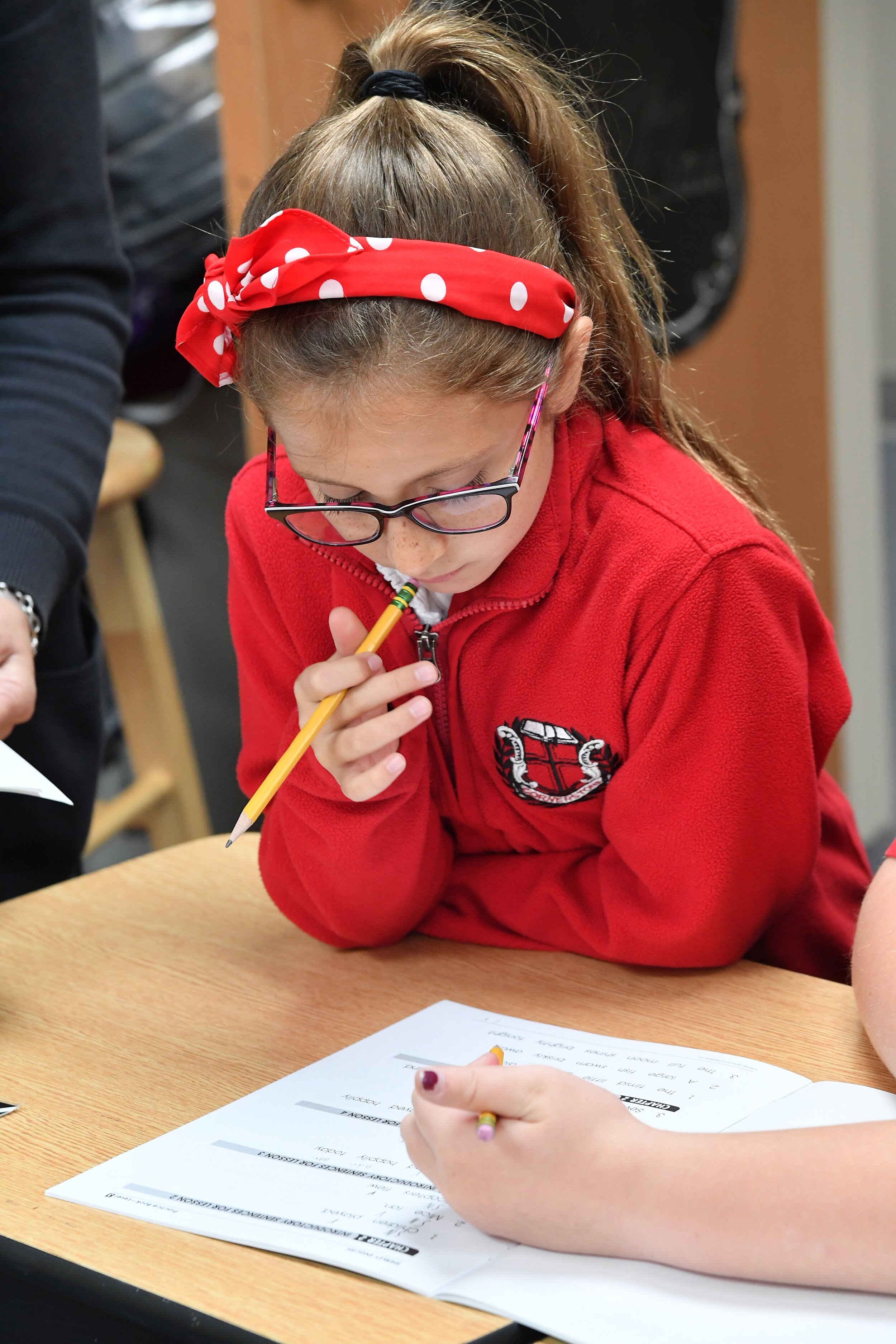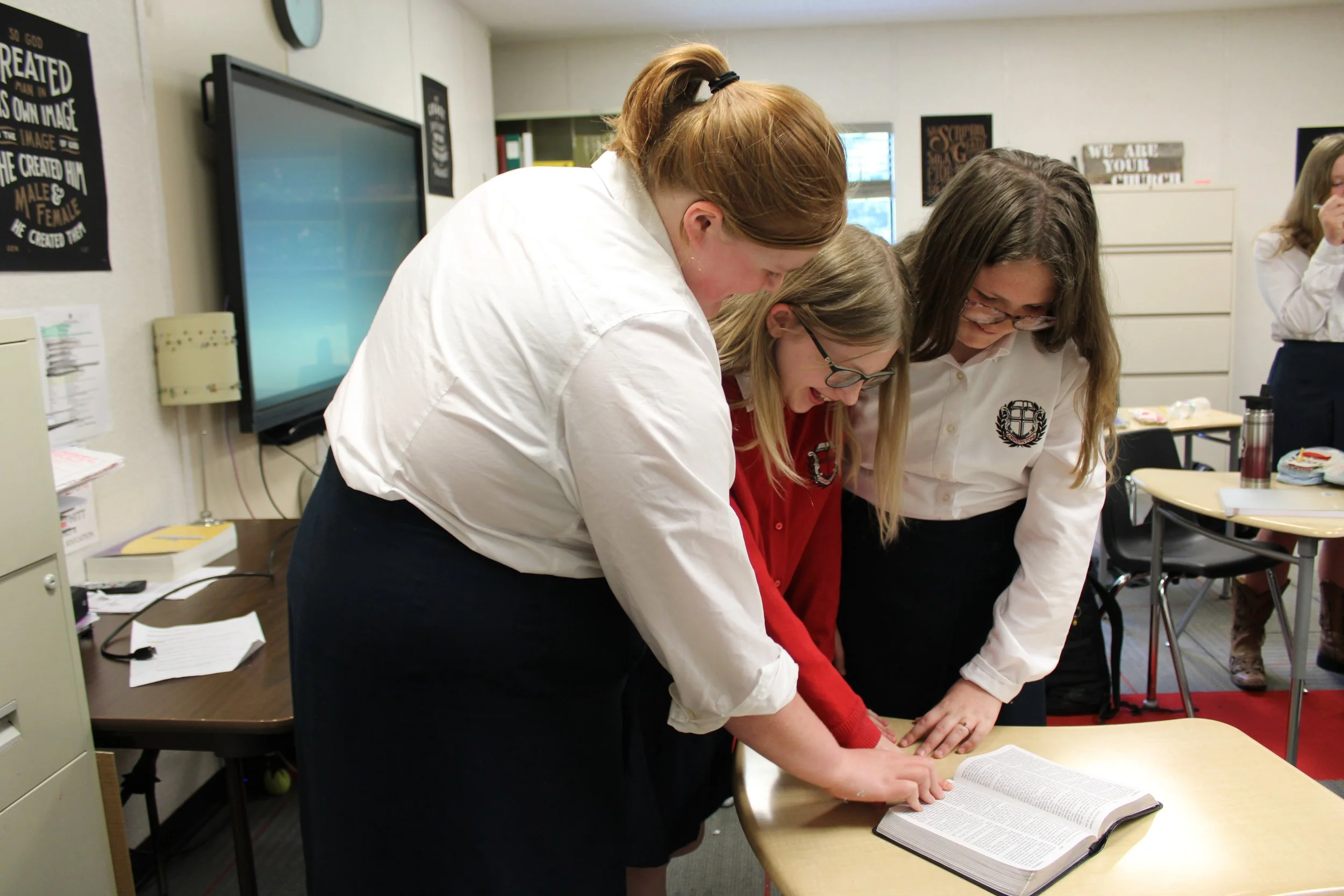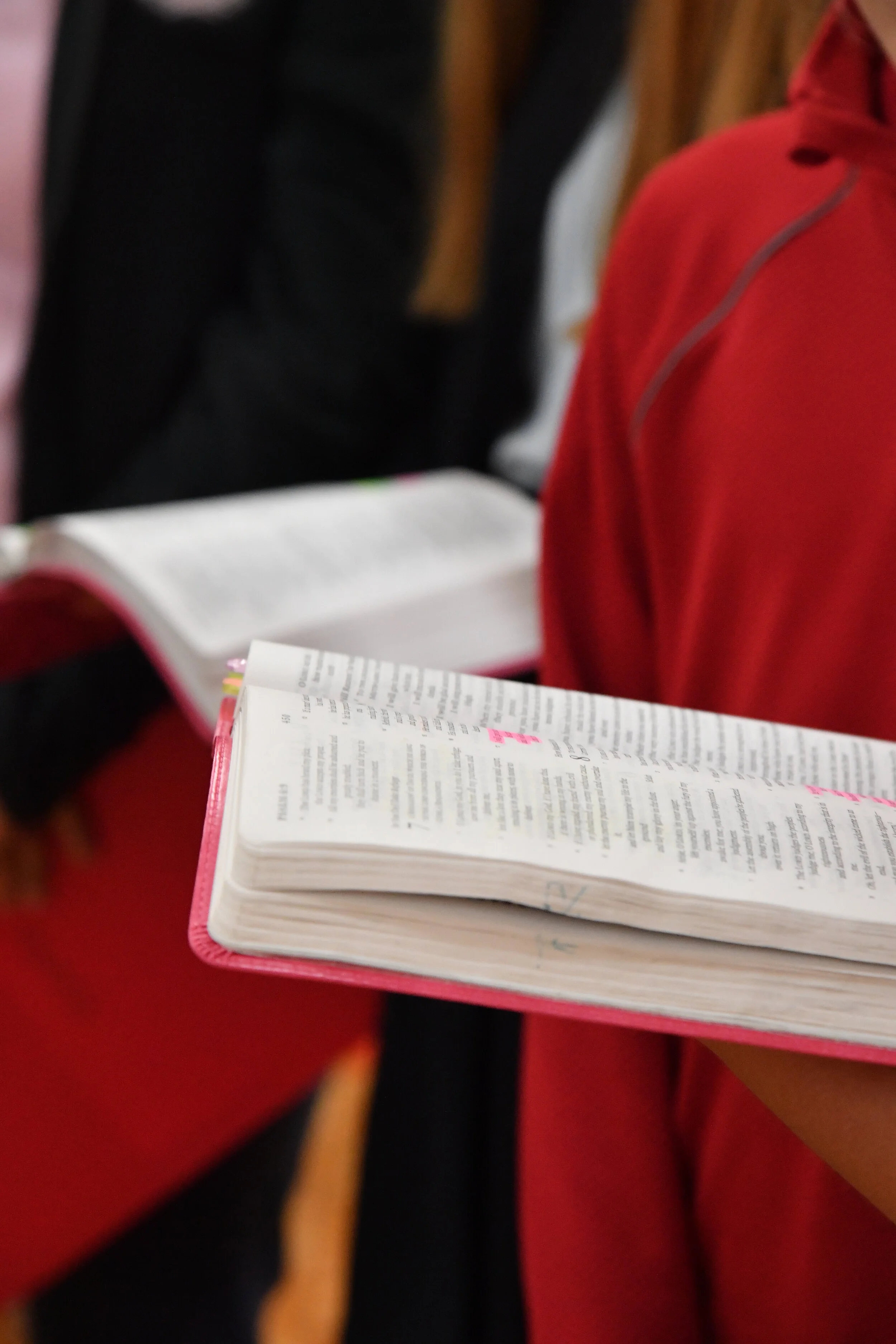
ACADEMICS
What is classical education?
“The foundational distinction between traditional education and modern education is that the ancients believed that education was fundamentally about shaping loves…They taught passions more than skills and content. They sowed seeds which would grow into a lifelong love of learning.” (The Liberal Arts Tradition)
Classical education is a continuation of the Liberal Arts tradition, which takes a holistic approach to education as a means of cultivating a student’s mind, body, will, and affections.
Classical Christian students participate in the Great Conversation with the best minds of the past as a means of discovering the truth, goodness, and beauty of God and His creation. In a world constantly attacking the notion of absolute truth, classical Christian students will have a foundational understanding that not only does Truth exist, but it is found in the person of Jesus Christ.
Classical methods include the time-honored trivium, or a three-fold approach to learning. These three foundational academic categories are grammar, logic, and rhetoric. The trivium corresponds to the three basic stages of a developing child.
By following the path of development that children naturally take, classical education teaches “with the grain” and equips students to master the art of learning. Classical Christian education can be summed up this way: the trivium provides the framework of learning, Scripture and classical curriculum furnish the core content, and Biblical truth is the fixed point of reference.
The Grammar Stage
The student learns the basic skills of reading, writing, and mathematics. Students K–6th grade are naturally good at memorization, and the grammar stage takes full advantage of this fact. This forms the foundation from which all other subjects can be approached.
End result: Student becomes knowledgeable.
The Logic Stage
The student studies formal logic and argumentation. Students 7th–9th grade have a natural argumentative tendency, which if properly channeled will enable children to think and draw their own conclusions based on facts.
End result: Student becomes a thinker.
The Rhetoric Stage
The student learns how to give expression to thoughts. In the high school years, self-expression is very important. The student who is classically trained will be able to communicate their thoughts with eloquence and clarity.
End result: Student becomes articulate.
Reprinted with permission from https://veritasschool.com/about/academics/
Biblical Rationale for Subjects at Cornerstone

Portrait of a Graduate
We desire to cultivate students who:
Understand and believe the Gospel, enjoying a growing faith in Jesus Christ.
We believe there is nothing more important in one’s life than to be reconciled with God, living in union with Him. It is faith in Jesus that reconciles us to God and allows His image in us to be restored. Walking in relationship with God, Cornerstone students will build virtuous habits and share the love of Jesus in words and actions.
Study scripture, pray, and serve faithfull in both the local body of Christ and the Community.
The rhythms of faith pervade all that we do and say as a school, and we give our students daily training and practice in the spiritual disciplines, including studying Scripture, praying, worshipping, and serving. Participation in a local church provides Christian formation and worship that connects them to God’s Kingdom, and we endeavor to continue this work at school through increasing knowledge of Scripture, a Biblical worldview, and discernment of what is good and true. Quality Instruction in Core Academic Disciplines
Read deeply and charitably, reason truthfully and rigorously.
Cornerstone trains students in both the art and mechanics of reading as key components of academic excellence. In teaching our students how to read, we teach them to read deeply, not settling for shallow or simplistic interpretations. We also teach them to read charitably, which means that they learn to understand a text and the author’s point of view without immediate criticism. Students engage with the Western canon, which simultaneously presents the truth, beauty, and goodness of God’s creation while also exposing students to quality non-Christian works that complement and challenge their Biblical worldview in a structured learning environment.
Speak and write with wisdom and eloquence.
Across the curriculum, Cornerstone trains students in the skill of persuading others of what is true, good, and beautiful. Students develop strong skills in rhetoric by speaking and writing with wisdom and eloquence, as one without the other is either ineffective or destructive.
Engage creation with wonder and a love of learning, pursuing beauty and working diligently.
The beauty of God and His creation awakens wonder, which causes us to desire to participate in that beauty more thoroughly. Created in God’s image, we also long to be creative. The more our students understand the purpose and form of creation, the better suited they are to work with its material and mechanisms. This is wonderfully illustrated through the skills of mathematics, which teach students how numbers, whether discrete or continuous, applying to motion or to rest, allow understanding of the rhythms of God’s creation. Joined with the persistence gained through hard work, students who have developed mathematical skills and whose sense of wonder is engaged by the beauty of God’s creation are equipped to participate in the sciences and fine arts productively and delightfully.
Love and serve Christ the King, bringing shalom by sharing the Gospel and acting for the good of others.
When our students’ highest allegiance is to Christ, loving and serving Him goes hand in hand with loving and serving our neighbors. CCA students are equipped with the armor of God and ready to share the gospel of peace according to Ephesians 6:10-18. Jesus, the Prince of Peace (shalom), said that He came to give life and give it abundantly. Our students endeavor to create shalom through the power of Christ by living in His peace, harmony, wholeness, completeness, health, safety, welfare, prosperity, and contentment. As His followers, our students spread this abundant life wherever they go by proclaiming the Gospel; caring for the needs of those around us; defending the defenseless; striving for peace; and exhibiting joy through laughter and friendship.

GRAMMAR SCHOOL DISTINCTIVES
Integration of the Christian Worldview
Our Grammar School classes will begin each day with devotions and prayer. Teachers will use a story-based, chronological curriculum for Bible. This foundation prepares the student for more advanced study in biblical interpretation, doctrine, and apologetics at the upper school level. With Christian teachers to mentor and instruct, students will learn what the Bible says about how we should live and view the world.
Extensive Training in Reading and Writing
At Cornerstone we want our students to love reading. Our instructors will use a proven phonics program to teach students reading through both direct instruction and active learning strategies. In order to encourage the love of beauty and truth, students are exposed to the best in children’s literature. Writing curriuculum follows the progymnasmata and teaches through a variety of methods including formal grammar, diagramming, and the development of well-written sentences, paragraphs, and essays by imitating the great writers of history.
Quality Instruction in Core Academic Disciplines
Students at CCA focus on quality instruction in six core academic disciplines
Biblical studies
History
English/literature
Science
Mathematics
Foreign language
At the grammar level, students are introduced to the essential facts, or “grammar,” of each of these disciplines. Students sing, recite poetry, and chant to acquire the foundation needed for more advanced studies. A narrative and linear approach to history brings it to life. In addition, excellent instruction in art and music develops creative gifts, and physical education develops healthy individuals.

LOGIC SCHOOL DISTINCTIVES
Cornerstone students will build on a strong Grammar School foundation, continuing and expanding on its core distinctives:
An integration of the Christian worldview
Quality instruction in core academic disciplines
Extensive training in reading and writing
The study of Latin language and Western culture
In the middle grades, students move from concrete to more abstract thinking. Thus, students have a greater appetite and capacity to discuss, debate, and argue over issues both great and small. The Logic School is a place of inquiry and dialogue, geared to meet the intense curiosity of these students. Teachers lead students in interactive class discussions, prompting them to think deeper about issues and ideas, and training students in civility and persuasion when expressing their opinions in both spoken and written word.
In 7th grade Logic class
Students learn how to construct sound arguments, to identify logical fallacies, and to think critically about issues. Emphasis is placed on the development of composition skills in order for students to be able to communicate their ideas with proper grammar, structure, logic, and clarity.
Logic School students
Take history and literature courses designed to deepen understanding of great ideas and cultural change. Students delve into primary sources and the Great Books to explore the relationship between actions and consequences found in history and fiction.
The study of Latin
Provides many proven benefits including increased vocabulary skills, advanced thinking skills, and a foundation for the study of other languages. The understanding of Latin culture provides a critical context to understanding our Western cultural heritage.
These students also expand their study of art and music to hone their skills of creativity and beautiful expression.

RHETORIC SCHOOL DISTINCTIVES
The Rhetoric School continues to develop skills gained in the Logic School. At the Rhetoric level:
Students increasingly apply these skills to evaluating and synthesizing information
Learn to construct a biblical interpretation of the subjects they study
Ultimately, our graduates will be able to apply a biblical worldview to ideas and works by first rate authors, and they will be able to articulate a thoughtful Christian response to the issues posed by the world around them.
integrated study of history and literature
Students will continue their studies at greater depth, moving chronologically from antiquity to the modern world in order to understand the roots and consequences of ideas and institutions as they have developed over time. This development will culminate in a senior year critique of modern culture, studying the sources and impacts of major influences such as Darwinism, Communism, existentialism, and Freudianism as well as more recent movements such as Deconstruction and Postmodernism.
Complementing historical and literary studies
The Bible curriculum at the Rhetoric level will address principles of interpretation, a survey of Bible doctrine, and then students will apply what they have learned with courses in apologetics and biblical worldview analysis so that they can formulate intelligent Christian responses to the influential thought systems which they will encounter in college and in adult life.
Latin study in the Rhetoric School
Aids students in finishing basic grammar and vocabulary and then gradually shift into translating and discussing great works in Latin literature such as the Latin Bible, Julius Caesar, Cicero, and various Roman poets.
Math and Science
Two other “languages” essential to an appreciation of God’s world are high school mathematics and the natural sciences. Students will apply logic, thinking, and writing skills to gain an excellent grounding in these disciplines, preparing them both for college-level work in these areas and to be informed adults capable of following and evaluating new developments in these fields throughout their adult lives.
essays and speeches
As with other areas, the skills emphasis of the Logic School will shift in the Rhetoric School to application in their study of logic. Students will focus upon constructing and presenting persuasive essays and speeches and developing research skills. Their senior year will culminate in a senior thesis, drawing together in practice all that they have learned about constructing a thoughtful and persuasive argument on a significant topic.


